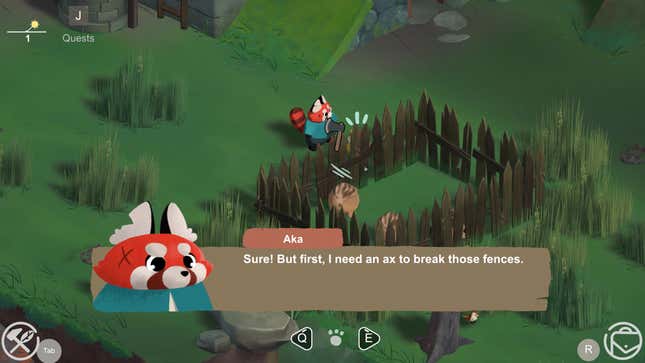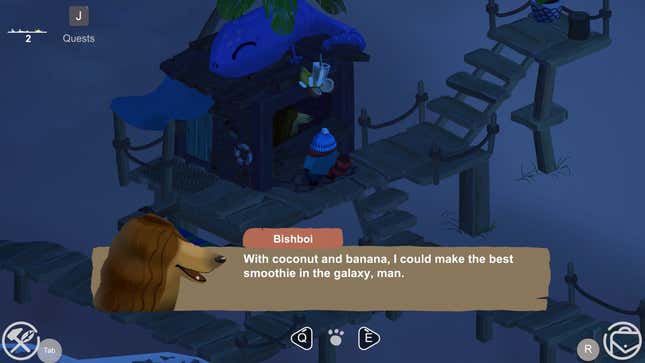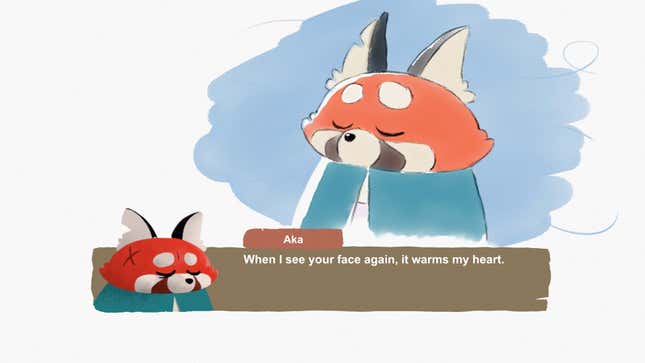
Every year there’s at least one game that’ll get me emotional enough to the point that I start tearing up. For me, this year, it’s Aka, a game about recovering from past violence and trauma. It plays out in a lite farming sim featuring cute characters, each of whom have a problem to solve as you try to build a life of peace for yourself and those around you. I’m finding Aka to be fun and charming all on its own, while also being a portal to inner reflection.
Out now for PC and Nintendo Switch, Aka is a very simple, open-world farming game with an endearing narrative and characters. It first popped up on our radar as a demo during October’s Steam Next fest and is ultimately about moving on from dark, violent days to build a better future. Though other farming sims offer more detailed simulations of farm-life nitty-gritty, spending time playing Aka has in some ways been more about spending time with myself, contemplating on how best to leave my own most difficult years behind.
In Aka you play as an anthropomorphic red panda named Aka—not a fox or a red raccoon, he is quick to remind you—who was once a soldier in a war. You start out by walking away from the battlefield and setting sail to Pine Island, a place your friend Thom promises is an opportunity to put violence and suffering behind you. You arrive on its shore to find that much work needs done. Trash is washing up, the land is overgrown and littered with traps, and many other anthropomorphic animals are caught in some state of peril that will require your intervention.

The folks on Pine Island, and the neighboring islands you’ll explore, each have different needs and desires, like a wolf caught in a trap and in need of magical healing, a ghost of someone who’s too scared of what their suffering has done to them to move on, or just a cool dog who’s out of coconuts and bananas wants to make the most epic smoothie ever blended. Some just want to play some music, and you’re free to jam along with them via a rhythmic mini-game. Others just want to lay on the beach and stare up at the clouds. You can join them, too. No matter where you go or who you help, two things are clear: This is a peaceful place, and Aka finally has an opportunity to leave his difficult war memories behind. Maybe it’s all a reminder of what you the player, too, can leave behind.
The actual farming elements, and the game mechanically as “a video game,” might not be meaty enough if you’re looking for some more hardcore sim stuff. (And if that’s what you seek, might I recommend the definitive hardcore simulation game, Dwarf Fortress).
The farming gameplay itself merely gets the job done. It’s sometimes tricky to line up seeds on a specific plot exactly the way you want. The menus aren’t super intuitive to navigate and sometimes a little buggy. The day-night cycle feels like it passes just a little too quickly. And other little quirks, like needing to actually come to a full stop to pick up an object (you can’t just hit the pick-up button while running over something), make Aka a little too simple and sometimes even cumbersome to recommend it strictly as a farming sim. But that’s probably not what you should be looking for in Aka.

Farming and crafting and running errands forms enough of a satisfying loop. Quests like fixing your boat or finding a carrot for a snowman give you goals to chase, but they’re all very simple. The heart of the game is in meeting characters who are either thought-provoking or in need of empathy. These encounters are what help make Aka a deeply contemplative experience that keeps me coming back.
I can’t help but think about my own past trauma while playing Aka. “War is over” says an opening prompt. Gentle, peaceful music over alluring art follows. As I’m talking to various characters who sometimes have their own painful memories of Aka’s war, I think about my own battles. For me those have been largely with myself, spilling out to cause collateral damage to those around me. But Aka is reminding me that my wars are largely over now, too.
Having transitioned from one gender to another later than I’d have ideally preferred, most of my own “better” years were spent in conflicting, cryptic agony. And I fought in many battles—against myself and others. It’s hard not to read Thom’s note to Aka with a promise of a more peaceful opportunity on Pine Island as the kind of thing I was searching for as I neared the end of closeted life. Aka’s own transition from a soldier to a farmer and problem solver is one from pain to peace, and like my real-life transition, it’s not only a solitary act but one accomplished by finding empathy and building connections—community—with others.

I find myself playing Aka, accomplishing tasks, farming, and crafting to make Aka’s life and the lives of the other characters a bit brighter, so that I can hang out on the beach with a hippo named Daydreamer to stare up at clouds. Or just jam out to some tunes with Kenny, the musical koala. It’s a reminder that the act of trying to be there for others in need is valuable, and makes a difference; and that all the time I spend crafting and creating is an act of recovery.
And it’s in that liminal space where Aka’s narrative and my own life sort of get tangled up. I wonder if that’s what I’m doing here too. In playing a game as a red panda going around tidying up a fictional island and improving the lives of others, I find inspiration to tidy up and move past my own difficult days, always with the reminder that the act of letting go can improve the world around me for those who are in it.